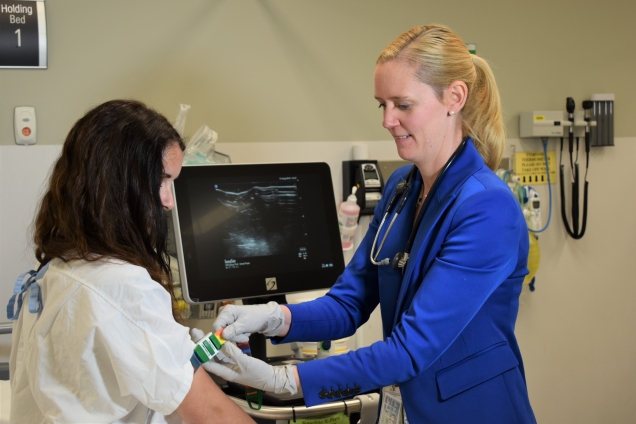
A new ultrasound training initiative is helping Gold Coast Health emergency department clinicians to find a patient’s vein during cannulation thanks to an Emergency Medicine Foundation (EMF) research grant.
Cannulating patients with a history of intravenous access issues, or no palpable or visible veins can cause patients significant distress and delays in potentially life-saving treatments.
Cannulation is a common medical procedure, with one in four patients in the emergency department and four out of five patients admitted to hospital having a cannula inserted.
Gold Coast University Hospital Emergency Department physician, Dr Amy Archer-Jones, was awarded an EMF research grant to lead a year-long study looking at the effectiveness of an ultrasound training intervention.
Dr Archer-Jones said the results of the training intervention were particularly good news for older patients and patients with chronic diseases or illness who are in regular need of intravenous medical treatment.
“We found that more than 30 per cent of emergency department patients had one or more risk factors for difficult cannulation, so we could see the potential benefits of improving intravenous cannulation rates and reducing complications in our hospitals were significant,” Dr Archer-Jones said.
“Ultrasound is known to improve the success rate of cannulation and patients’ satisfaction as well as reduce complications.
“When we trained 195 medical and nursing staff in using ultrasound for cannulation, we showed that many felt more confident in administering fluids and medications intravenously.”
The ultrasound guided cannulation training is now a permanent fixture in the Gold Coast University Hospital and Robina Hospital Emergency Departments, with the team extending the program to staff Hospital-wide.
Dr Archer-Jones is hopeful ultrasound-guided vascular access will become the first method of choice for cannulation in Gold Coast Health patients with difficult IV access, adding that patients who have previously experienced difficulties with the process are now being encouraged to request ultrasound guided cannulation.
EMF General Manager, Dr Sonĵ Hall, said it was wonderful to see the success of the training intervention which meant more doctors and nurses were using ultrasound to find veins.
“The results just go to show how the different forms of research can evolve into meaningful change in the way emergency medical care is delivered and I am proud EMF has facilitated these improvements in cannulation processes,” Dr Hall said.
The EMF Queensland Research Program is funded by Queensland Health.



